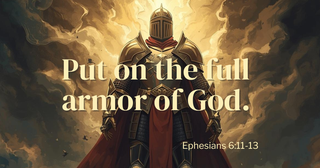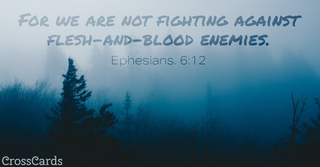- Recent Translations
- All Translations
Ephesians 6:12
Share
Settings
Ephesians 6:12 in Other Translations
Ephesians 6:12 Meaning and Commentary
For we wrestle not against flesh and blood
The Syriac, Arabic, and Ethiopic versions, and some copies, read "you", instead of "we". This is a reason why saints should be strong in the Lord, and why they should put on the whole armour of God, and prepare for battle, since their enemies are such as here described: not "flesh and blood"; frail mortal men, such as were wrestled against in the Olympic games, to which the apostle alludes. For this wrestling, as Philo the Jew says F5, concerning Jacob's wrestling, is not of the body, but of the soul; see ( Matthew 16:17 ) ( Galatians 1:16 ) ; and the meaning is, not with men only, for otherwise the saints have a conflict with men; with profane men, and wrestle against them, by bearing a testimony against their enormities, and by patiently enduring their reproaches, and conquer them by a constant adherence to Christ, and an exercise of faith upon him, which gets the victory over the world; and with heretical men, and maintain a conflict with them, by watching and observing the first appearance of their errors and heresies, and declaring against them, and by using Scripture arguments to confute them, and by rejecting the stubborn and incorrigible from church communion: yet they wrestle not against these only,
but against principalities, against powers;
by whom are meant not civil magistrates, or the Roman governors, though these are sometimes so called, ( Titus 3:1 ) , and may be said to be the rulers of the darkness of this world, or of the dark Heathen world, and were in high places, and were of wicked and malicious spirits, against the people of Christ; yet these cannot be opposed to flesh and blood, or to men, since they were such themselves; and though they were in high, yet not in heavenly places; and the connection with the preceding verse shows the contrary, the enemy being the devil, and the armour spiritual; wherefore the devils are here designed, who are described from their power, rule, and government, (See Gill on Ephesians 1:21), both in this clause, and in the next:
and against the rulers of the darkness of this world;
that is, over wicked men in it, who are in a state of darkness itself; and so Satan is called the prince, and god of the world, ( John 12:31 ) ( 2 Corinthians 4:4 ) . The Jews use this very word, the apostle does here, of the angel of death; who is called darkness F6; and the devil is called by them, (Kvwx lv rv) , "the prince of darkness" F7; and mention is made by them of (amle ykwvx) , "the darkness of the world" F8; from whom the apostle seems to have taken these phrases, as being in common use among the Jews; who also use it of civil governors F9, and render it, as here, "the rulers of the world", and say it signifies monarchs, such as rule from one end of the world to the other F11: some copies, and the Ethiopic version, leave out the phrase, of this world. It follows,
against spiritual wickedness in high places;
or wicked spirits, as the devils are, unclean, proud, lying, deceitful, and malicious; who may be said to be in "high" or "heavenly places"; not in places super celestial, or in the highest heavens, in the third heaven, where God, angels, and saints are; but in the aerial heavens, where the power or posse of devils reside, and where they are above us, over our heads, overlooking us, and watching every advantage against us; and therefore we should have on our armour, and be in a readiness to engage them; and so the Syriac and Ethiopic versions render it, "under", or "beneath heaven"; and the Arabic version, "in the air".
F5 Leg. Allegor. l. 2. p. 96,
F6 Vajikra Rabba, sect. 18. fol. 160. 1. & Shirhashirim Rabba, fol. 25. 4.
F7 Pesikta in Kettoreth Hassammim in Targum in Gen. fol. 9. 4. Raziel, fol. 13. 1.
F8 Zohar in Lev. fol. 19. 3.
F9 Bereshit Rabba, sect. 58. fol. 51. 2.
F11 Tanchuma & Aruch in Guidon. Diet. Syr. Chal. p. 169.



